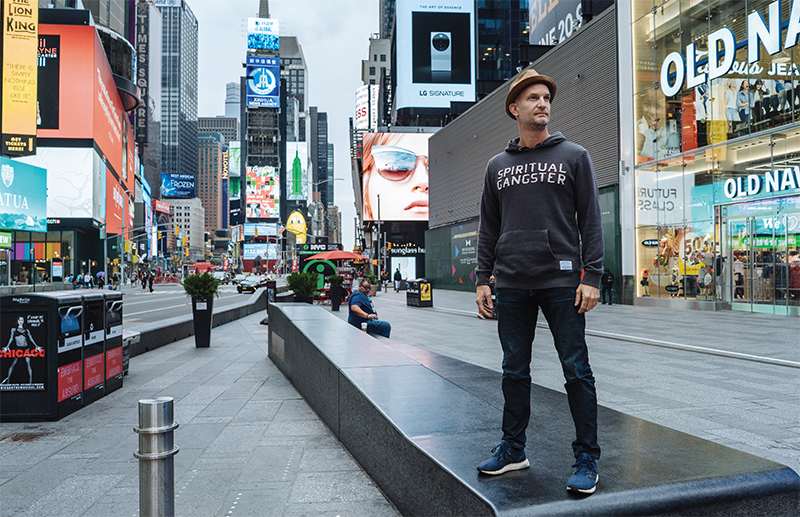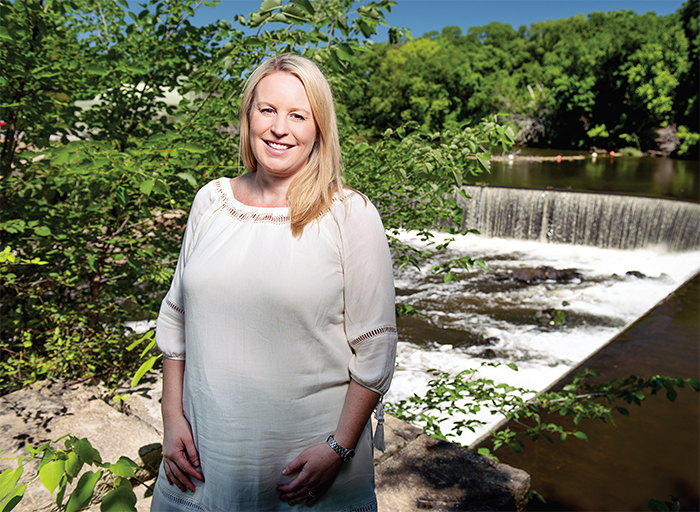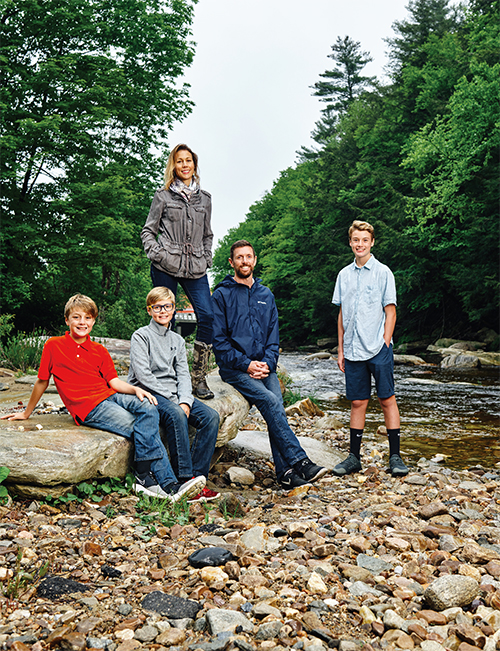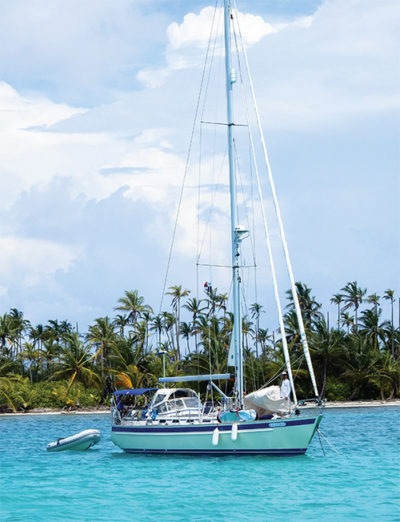
Joel Holland '08 is the owner of Harvest Hosts, a network of farms and vineyards across the country that allows RVs to park for the night. Holland's RV is parked at Mountain Cove Vineyards, a Harvest Host participant in Lovingston, Virginia. Wesley the dog makes his home at the winery.
If confronted with a tricky business problem, one that seems too difficult to figure out, entrepreneur Joel Holland ’08 offers a piece of advice: Hit the road.
From the wheel of his Ford pickup, which pulls his 33-foot-long RV trailer, Holland has driven many a mile. As rest stops, billboards, and exit signs blur by, his eyes may watch the road, but his mind roams elsewhere. “I’m trapped for hours with my thoughts,” he says. “You can’t escape them, but in a way, that’s good. Your mind can dwell on problems. You start thinking, how can I fix this? I’ve had breakthroughs with self-conversations.”
Holland is the founder and executive chairman of Storyblocks, a subscription service based in Arlington, Virginia, that provides stock images, audio, and video. Holland started the company the year before he enrolled at Babson, a kid chasing a dream in his parents’ house. Since then, it has grown into a successful enterprise with 100 employees and a digital library of 10 million files that subscribers can peruse. In 2017, the company earned $32 million in revenue.
That entrepreneurial journey was enthralling and rewarding, but it also overwhelmed Holland at times, leaving him feeling unsettled and burned out. “I was so immersed. I needed to come up for air,” he says. “I had a desire to get up and run.”
The RV, with its promise of wanderings and adventure, proved his salvation. He bought it in 2013. Out of town for a wedding, Holland found himself with some time to kill and, on an impulse, checked out an RV dealership. He always had enjoyed road trips, and suddenly, as he talked to the salesman, the idea of owning an RV began to feel right. Two weeks later, it was his.
At first, though, Holland was a little hesitant to use it. As CEO, he was fully engrossed in running the company, so disappearing in an RV didn’t seem like a smart idea. “I was really worried that, if I wasn’t present, things would fall apart,” he says. But his colleagues supported him, told him he deserved some time away, so Holland began taking regular jaunts of a week or more in his RV. He was never completely unplugged and was almost always reachable, but nonetheless, he felt lighter. The stress of the office melted away with the miles. “When I’m traveling,” Holland says, “I don’t dwell on anxiety.”
Fast forward to 2016. Holland removed himself from the company’s day-to-day responsibilities, stepping down as Storyblocks CEO and becoming executive chairman, and took to the road full time. He traveled from coast to coast and was amazed at the country’s beauty. “If I had to summarize America in one word, it’s variety,” he says. “I can go through the lush greens of Kentucky, to Tornado Alley and the flatlands of Oklahoma, to the majestic mountains of Colorado, and then end up in Malibu for drinks on the beach.”
Before taking to his RV, Holland hadn’t traveled to the heart of the country, to all those states that he and so many of us simply fly over on the way to somewhere else. Now he explores every nook and cranny of the U.S. and makes the effort to reach out and talk to people, whether coal miners in West Virginia or tailgaters at a NASCAR race in North Carolina. “I’ve met people from all walks of life,” he says.
Holland’s companion for many of these adventures has been his then-girlfriend, now wife, Mary Ashley, whom he married last year. Holland took it as a good sign that they got along so well even after spending months together traveling. “We were in close quarters, and we didn’t want to kill each other,” he says. Still, a few months ago, Mary Ashley decided to return to the couple’s often vacant home in Vail, Colorado, and resume working as a veterinarian. Around that time, Holland began to feel something he hadn’t felt in a while: the entrepreneurial itch. Yes, travel was wonderful, but after two years on the road, he missed the everyday fulfillment of working and business. “It hit me like a bag of bricks,” he says. “I got to do something.”
Holland had an idea. Having visited the 48 contiguous states in his RV, driving about 50,000 miles along the way, he saw that many RV parks are congested and unappealing. He then thought about how the country is full of farms and wineries. What if a company existed that could help RV owners find places like that to park their vehicles for the night?
Holland contemplated starting such a company but then discovered one already existed: Harvest Hosts. He contacted the owners, who had been running the venture for nine years, and asked if they were up for selling. After some negotiations, Holland bought Harvest Hosts in May and now runs a company that aligns perfectly with his love of RVs and traveling.
An annual membership at Harvest Hosts allows RV owners to stay for free at a network of more than 600 farms, vineyards, museums, and attractions, and Holland is hoping to sign up hundreds more locations. While he holed up in Vail for part of the summer, he remains on the road more often than not these days, with his wife often flying out to meet him. His RV has a cozy workstation, and his days have a predictable rhythm, with Holland taking business calls at 9 and 10 a.m. before hitting the highway.
For Holland, the road remains his office, his home away from home, his inspiration. “I find it hard to ease back on traveling,” he says. Perhaps one day he and Mary Ashley will have children, but he doesn’t think even that will curtail his wanderlust. “I know a lot of parents who take their kids with them,” he says. “You can throw your kids in the RV and have total flexibility.”
Traveling with Kindness
Leon Logothetis’ life is a series of adventures. And those adventures have put him in some daunting situations. Earlier this year, for instance, Logothetis ’99 embarked on a trek from Alaska to Argentina in a 50-year-old yellow Volkswagen Beetle. “I arrived in Alaska, it’s minus 30, and I’m in a car that doesn’t have any heating,” he says. In that instant, one thought blared in his head: “You’ve gone insane.”
To understand how Logothetis arrived at that moment, however, involves going back to 2005, when he was living in London and working as a stockbroker. From the outside, his life seemed like a success, but Logothetis was uninspired and unhappy, living what felt like some other person’s idea of the perfect existence. “It wasn’t me,” he says. “I reached a point where I was in a terrible place. The pain was so much, the feeling that I was wasting my life.”
Watching The Motorcycle Diaries, a romantic road movie about guerrilla leader Che Guevara’s travels as a young man, Logothetis grew inspired. “It touched me. I always felt this urge to go on an adventure,” he says. “I wasn’t built to sit behind a desk. I was built to connect. I was built to meet the world.” Feeling like he had no other option, he quit his job and set off on a life very much beyond the typical, a decision that left those around him baffled. “They thought I was a nut job,” he says.
Since then, Logothetis has become a traveling man, visiting more than 90 countries and undertaking a slew of fantastical journeys that have become the basis for books and TV shows. In its three seasons, Amazing Adventures of a Nobody, which aired on the National Geographic channel and also led to a book by the same name, Logothetis traveled across the U.K., the U.S., and Europe on 5 pounds, 5 dollars, and 5 euros, respectively, per day. In Live, Love, Explore, which is part memoir, part self-help book, Logothetis details his adventures and the life lessons he learned from them. For his most recent project, The Kindness Diaries, which was first a book that later became a Netflix TV show, Logothetis traveled around the world on a vintage motorcycle, relying on the kindness of strangers for food, gas, and shelter.

Photo: Gene Smirnov
New York’s Times Square holds special significance for adventurer Leon Logothetis ’99, who has visited more than 90 countries. He once launched a cross-country trek from there, traveling all the way to Hollywood, California, on only $5 a day.
Logothetis admits that approaching strangers and asking for help isn’t easy. Most people turn him down. But when he’s in an unfamiliar town and desperate for a place to sleep, he keeps trying. “You always find that person,” he says. “It’s about speaking to their heart.”
Whenever someone has helped him, he makes sure to return their kindness in some way. In one episode of The Kindness Diaries, Logothetis talked with a man named Tony in a Pittsburgh park. When Logothetis asked Tony if he could stay with him that night, Tony revealed that he was homeless. “My initial reaction was shame,” Logothetis says. “I’m asking to stay at his house, and he has nothing. What’s wrong with me?” But Tony offered to share some food and blankets, so Logothetis, deeply moved by the gesture, spent the night sleeping next to him on the concrete. Calling Tony one of the most generous men he has ever met, Logothetis says, “He taught me true wealth is not in our wallets. If he can be kind and he has nothing, then I have no excuses.” The next day, Logothetis offered to help find Tony housing and put him in a certificate program. Tony was left with tears in his eyes.
When Logothetis started going on adventures, he was motivated by self-preservation and the need to find fulfillment in his life. “I wanted to free myself,” he says. But as the years passed, and he encountered more people and drove mile upon mile, that motivation has changed. Now he hopes to embolden people to spread kindness and also to leave their unsatisfying jobs behind. “It’s not good enough to just travel for yourself,” he says. “My mission is to do everything in my power to inspire others to see there’s another way to live.” He has heard from thousands of people who have been touched by his travels. “I feel honored. That’s why I do this,” Logothetis says. “It makes traveling worthwhile. It makes freezing your ass in Alaska worthwhile.”
Speaking of the cold of Alaska, that’s where Logothetis started filming season two of The Kindness Diaries. His journey in that old Beetle from Alaska to Argentina, which took almost four months, was recently completed. The new season is set to premier on Netflix in December. Looking ahead, Logothetis already is planning the show’s third season, which will be a trek from South Africa to Finland, a more than 9,000-mile journey. “You never know what’s going to happen,” he says. “I look forward to the Sudanese border.”
While he’s a man at home in the world, Logothetis does rent a house in L.A., even if adventures and motivational speeches, of which he delivered 100 last year, mean he’s rarely there. Still, he enjoys those brief moments of rest, until it’s inevitably time to get moving again. “I get itchy feet,” he says.
Connecting with Culture
A prolific traveler for her job, Jaclyn Leibl-Cote, MBA’15, is away from home about 90 days in a typical year. Ask where she went last year, and she’ll start rattling off destinations, Dubai, Abu Dhabi, Spain (twice), Canada, the U.K., before pausing to think. The trips have become a blur in her mind. “I’m definitely not remembering,” she says.
Leibl-Cote is president of her family’s business, Collette, a 100-year-old travel company based in Pawtucket, Rhode Island. With close to 700 employees around the world, Collette offers over 160 group tours, which take travelers to 56 countries. Leibl-Cote and her team supervise the dozens of guides who bring these tours to life, as well as examine the company’s offerings to see which tours to improve and add.
Everything on a tour is planned. Leibl-Cote and her team vet hotels, restaurants, bus and train companies, and attractions, and they travel to destinations to perform the vetting. Such excursions may sound exciting, but the work is exhausting, the days long and tiring. A city may boast hundreds of restaurants, for example, and the team’s job is to winnow those down and select the right ones for the tour. “When I interview people for a job, I say, ‘This isn’t a vacation,’” Leibl-Cote says.
Collette always is thinking about its tours and every year adds between 10 and 20 new offerings. The travel industry is full of copycats, says Leibl-Cote, noting that other travel companies have copied Collette’s tours down to the itinerary. “You can’t trademark the world,” she says. “We have to always be creative.” The company also must try to anticipate where its customers, who often seek destinations that haven’t been “discovered” yet, will want to go. The decision process is part market research and part intuition. Sometimes the company is wrong, but other times it nails it. “We launched Iceland with one tour,” Leibl-Cote says, “and it just took off.”

Photo: Webb Chappell
Jaclyn Leibl-Cote, MBA’15, is president of Collette, a 100-year-old travel company that’s based in Pawtucket, Rhode Island, in an office along the banks of the Blackstone River.
Collette also must keep up with travelers’ expectations, which have changed over time. “Travel used to be about the bucket list,” says Leibl-Cote. “People would want to see the Eiffel Tower. They would want to go to the Colosseum. People want experiences now. They want to meet people in a local village, to sit in a cafe, to do a cooking demonstration, to feel like they’re living like a local. We’re connecting people with culture, we’re connecting them with experiences.”
The ability to connect with a culture, to immerse oneself in it, is one of the main allures of travel for Leibl-Cote. “For me, travel is the biggest educator. It is a gift,” she says. “I live in Rhode Island. That would be a very small place to stay. You have to spread your wings and see what’s out there.” Leibl-Cote doesn’t make assumptions about a country or culture from what she sees in the media. “I see it with my own eyes,” she says. “When you go there and walk in the footsteps of people and talk to them, that can bridge stereotypes.” Leibl-Cote hopes all Collette customers take away such a deeper understanding of a place from their trips. “I hope they feel connected to the culture they visited, that they come back and have an appreciation of the people,” she says.
Nowadays, travelers can do so much of their own trip planning online, from booking hotels and flights to researching restaurants and sights to see, but sifting through the myriad choices the Internet provides can be difficult. That’s why the personal touch that Collette provides is still valued, says Leibl-Cote. “We had a record year in 2017,” she says. “We’re seeing upward trends in growth.”
Leibl-Cote is one of eight family members who work full time at Collette. Her grandfather bought the business in 1962, and she has worked there for much of her adult life. Her three children, twin 7-year-old boys and a 5-year-old girl, represent the company’s next generation. “They see the hard work that goes into it,” she says. “I do it for the three of them. It’s a family business. I want to pass it on to them.”
Of course, leaving the three of them to go on work trips isn’t easy. As much as Leibl-Cote loves to travel, as much as she loves adding another stamp to her passport, she also loves to come home. When her airplane lands at Boston’s Logan Airport and the pilot over the intercom says, “Welcome home,” she takes that to heart.
Sailing on the Wind
Ever since he was a boy, Robert Lahue ’99 wanted to take to the sea. For a long time, that dream was his alone. After graduating from Babson, however, he and his then-girlfriend, Betsy, sailed off the East Coast for a year. When that voyage was done, they looked to the future and vowed to sail again together one day. “I found someone who embraced my dream as well,” he says. “It became our dream.”
Robert and Betsy got married, had three boys, and built careers. She was an executive at a medical device manufacturer, while he was a real estate investor. They hadn’t forgotten about their dream of the sea, and in fact were setting aside 10 percent of their income every year toward making it happen. But still, time was passing. They felt settled in the New Jersey town they called home. Could they really uproot their family, walk away from their careers, and take off on a long sailing adventure? “We realized we have to do this before the motivation was lost,” Lahue says. “I wouldn’t have been happy with myself if we didn’t make it happen.”

Photo: Douglas Levy
The Lahue family (left to right), J. Oliver, Myles, Betsy, Robert ’99, and Henry, now make their home in Stratton Mountain, Vermont, after spending nearly two years sailing aboard the Alkemi.
So they decided to go for it. Betsy quit her job, and Lahue began selling off his rental properties. They sold their house, and they bought a boat, a 45-foot sloop named Alkemi. Their boys, Henry, Myles, and J. Oliver, then ages 12, 10, and 8, looked forward to the upcoming journey with excitement, and their friends and family were left to marvel that the Lahues were actually doing it, that they were leaving everything behind to take the trip of a lifetime.
In the summer of 2016, the family moved aboard the Alkemi, sailing down the East Coast out of Maryland. Immediately after departing, the family relished all the time they suddenly had together. Back in New Jersey, their days had seemed so hectic, the adults with their careers and social obligations and the kids with their many activities. “We all had our own lives,” Lahue says. “We were getting to know each other again.”
Still, the relentless feeling of needing to keep busy took a long time to fade away. “We used to measure our day by how much we accomplished,” Lahue says. “It takes a while to get that out of your system.” Sailing to the Caribbean and then to Central and South America, Lahue says it wasn’t until the family reached Colombia, a good 11 months into the trip, that he finally was able to accept and ultimately embrace a slower pace of life. “We didn’t have to fill every moment anymore,” he says.
As life slowed down, the children relied more on their imaginations to amuse themselves. They read books and kept journals. One son played guitar, while another created an elaborate make-believe country. The family also made time for their faith, something that had slipped away from them in their busy lives in Jersey. Their return to spirituality was partly inspired by having time to sit, enjoy a sunset, look at the stars, and contemplate. But the family also came to rely on their faith when confronted with uncertain situations, such as during storms. The family once was caught in a gale with 12- to 15-foot waves, which crashed over the boat. While the children were kept safely below, the adults were on deck, watching the boat’s course. “You are wearing a life jacket and hooked in with a harness,” Lahue says. “My wife and I had to comfort and reassure each other. It was frightening.”
As the trip went on, the family traveled from Panama and Colombia, to Jamaica and the Cayman Islands, to Mexico, Cuba, and back to the U.S. Throughout the journey, the Lahues encountered a range of people. Lahue recalled how they became friendly with a family from Israel on another boat. “The kids didn’t know each other’s languages, but they played with each other a lot,” he says. As they made excursions on land, the Lahues also met people living in severe poverty. “Those kinds of experiences were good for the children to see,” Lahue says. “You get wrapped up in wanting things. It gives you a new perspective on your life.”
Finally, the trip came to an end this past April in Key West, Florida, and Alkemi was sold to a new owner. The adults felt like they could have continued on, but the boat was starting to feel smaller as the boys grew older and taller, says Lahue. The boys also were eager to return to a regular school after being home-schooled for two years on the boat.

Photo Courtesy Robert Lahue ’99
The Lahues sailed aboard the Alkemi, a 45-foot sloop.
As he looks back on the voyage, a dream Lahue had harbored for so long, he thinks about how it turned out differently from what he had envisioned so many years earlier. “I thought it would be about seeing cool places and being in tropical destinations,” Lahue says, “but ultimately, it was about spending more time with family and learning to appreciate a simpler life.”
To hold on to that simpler, more laid-back lifestyle, the family has moved to their ski condo in Stratton Mountain, Vermont, and Robert and Betsy are now trying to figure out what the next step in their careers will be. They’re hoping to tackle an entrepreneurial opportunity.
They’re also hoping one day to return to the sea. Next time, they want to sail and explore the Pacific.
